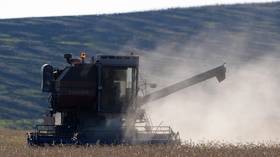Russian agricultural exports boom as Covid-19 pandemic and freak weather ruin crop harvests for American and European farmers

Mineral deposits, oil wells and vast timber forests have long been the world’s largest country’s handy cash cow. But with the rise of climate change, Russia’s agricultural sector is now boosting efforts to diversify its economy.
Veronica Nikishina, the CEO of Moscow’s exports watchdog, told news agency TASS on Wednesday that the volume of shipments out of the country that aren’t fuel or natural resources has increased to record highs. At the end of 2020, these exports accounted for $161.3 billion of overseas orders, she said, which is higher than in previous years and a rise of almost four per cent.
According to data from the Russian Export Center (REC), one in five containers shipped abroad was made up of processed metal products, while similar levels of engineering and construction products, as well as food, were sold as well. Chemical supplies were also well-represented.
However, the driving factor in the increasing global importance of these Russian shipments was food, with the value of Russian wheat exports rising by $1.8 billion and sunflower oil by more than $600 million.
Also on rt.com As Paris asks Berlin to suspend Nord Stream 2, Gazprom reveals France has increased its own purchases of Russian gas by almost 50%The REC says that the impact of the Covid-19 pandemic on agricultural sectors in other nations has created a greater reliance on imports.
In April last year, amid fears of the rapidly-spreading virus and successive national lockdowns across the world, a number of countries issued warnings over falling agricultural production.
The death of the lucrative restaurant trade in the US and much of Western Europe hit farmers’ profit margins and led to produce rotting in fields and vast quantities of unsold milk being dumped.
At the same time, changing weather conditions were to blame for poorer harvests elsewhere. In the UK, for example, 2020’s annual wheat yield was 37.5 percent slimmer than the previous year, which the industry chalked up to extreme weather.
Also on rt.com Russia needs regulations for grain exports to control rising food prices – PutinJames Webster from the UK’s agricultural board said that “wheat quality is down too, so from a milling perspective in particular, [we’re] going to see a lot of imports and we are already hearing of volumes of imports.”
With many Western nations still languishing in lockdowns and facing changing weather conditions, Russian farmers will be hoping that their produce can continue to make up the shortfall in what consumers put on the table.
Think your friends would be interested? Share this story!













